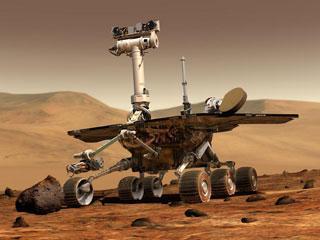
Artist concept of Mars Exploration Rover, Spirit. Photo: NASA/JPL-Caltech.
WASHINGTON (AFP): A US space agency rover tooling around on the dry surface of Mars has for the first time uncovered direct evidence of what used to be a freshwater lake, scientists have said.
There is no water left in it, but drill tests and chemical analysis of fine-grained rocks by the Curiosity robot's science tools suggest conditions were right for the lake to have once supported microbial life, perhaps 3.6 billion years ago.
The rocks contained signs of carbon, hydrogen, oxygen, nitrogen and sulphur, and "would provide perfect conditions for simple microbial life," said the report in the journal Science.
Small bacterial life forms known as chemolithoautotrophs are known to thrive under similar conditions on Earth, and are typically found in caves and under the sea in hydrothermal vents.
The findings were reported in Science and described at a meeting of the American Geophysical Union in San Francisco, California.
"This is the first time that we have actually found rocks on Mars that provide evidence of the existence of lakes," co-author Sanjeev Gupta of Imperial College London told AFP in a phone interview on Monday.
"This is great because lakes are a perfect environment for simple microbial life to develop and be preserved," he said.
While no life forms have been detected in the rocks, Gupta said the mobile Mars Science Laboratory has drilled into the mudstone and sandstone rocks and found clay minerals, suggesting an interaction with water.
The sandstone also resembles that found in Earth rivers, leading scientists to hypothesize that a river once flowed into the lake, which lies at the foot of a low mountain.
Researchers have already found evidence of water elsewhere on Mars' surface, and the work of past orbiters has strongly suggested Mars had lakes at some point.
The US space agency chose the Gale Crater as the landing site for the unmanned, six-wheeled Curiosity rover -- which landed in August 2012 -- specifically because it was believed to contain many geological layers and likely held water.
The latest findings provide "the strongest evidence yet that Mars could have been habitable enough for life to take hold," said the study.
 Previous Article
Previous Article Next Article
Next Article












The Indian Air Force, in its flight trials evaluation report submitted before the Defence Ministry l..
view articleAn insight into the Medium Multi-Role Combat Aircraft competition...
view articleSky enthusiasts can now spot the International Space Station (ISS) commanded by Indian-American astr..
view article